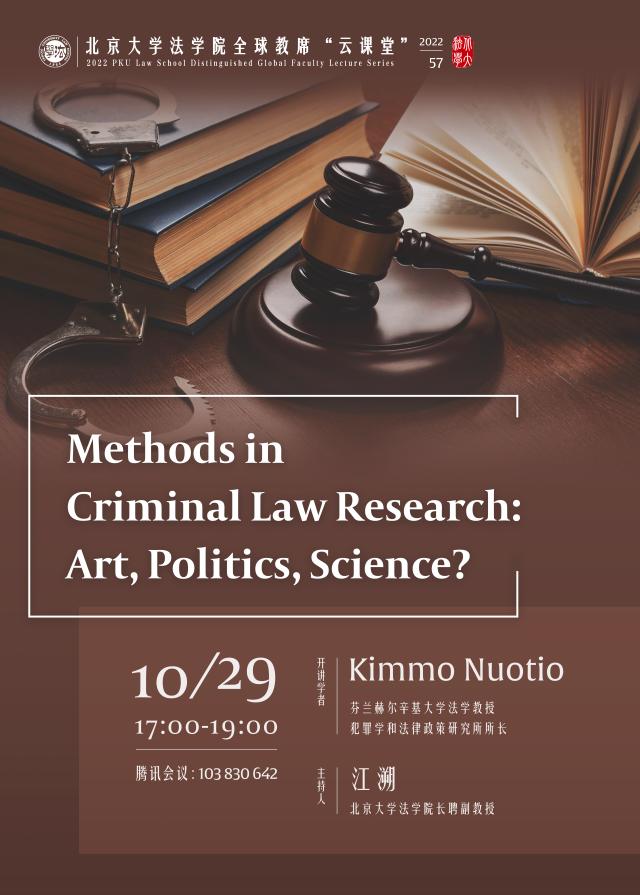全球教席“云课堂” —— Kimmo Nuotio:刑法研究的方法论:艺术、政治、还是科学?
时间:2022-10-25 来源:作者:

题目:Methods in Criminal Law Research: Art, Politics, Science?(刑法研究的方法论:艺术、政治、还是科学?)
时间:2022年10月29日(周六)17:00-19:00
腾讯会议 ID:103-830-642

开讲学者:Kimmo Nuotio(芬兰赫尔辛基大学法学教授、犯罪学和法律政策研究所所长)
主持人:江溯(4494.c威尼斯长聘副教授)
评议人:王华伟(4494.c威尼斯助理教授)张梓弦(4494.c威尼斯助理教授)
开讲学者简介:
Kimmo Nuotio 教授曾任芬兰战略研究委员会主席、赫尔辛基大学法学院院长和欧洲大学研究所法律系让·莫奈研究员。他的研究领域包括:刑事责任的理论基础、刑法现代化、欧洲和国际刑法、刑法跨国化、欧洲法律一体化和刑法与文化多样性等。
Kimmo Nuotio is professor of criminal law. He is chairing the Strategic Research Council (2019-2021). Nuotio is former Jean Monnet Fellow of the European University Institute, Department of Law (2000-2001). He was the Dean of the Faculty of Law of the University of Helsinki in 2010-2017. He has been a visiting professor at the University of Toronto and the KU Leuven. Nuotio was the director of the nation-wide doctoral programme in Law, funded by the Ministry of Education and Culture and the Academy of Finland, under the title "Law in a Changing World" (2007-2015), and Member of Board of the University of Arts (2015 - 2017). He was the chair of board of Alexander Institute (2014-2018).His central research topics include: Theoretical Foundations of Penal Liability, Modernization of Criminal Law, Nordic, European, and International Criminal Law, Transnationalization of Criminal Law, European Legal Integration, Risk Society / Welfare State / Security, Political Philosophy and Law, Criminal Law and Cultural Diversity.
讲座摘要:
本场讲座将基于2021年Kimmo Nuotio教授与日本学者Shin Matsuzawa教授合作出版的著作《Methodology of Criminal Law Theory: Art, Politics or Science? 》,讨论刑事责任的一般学说在刑法理论化中的作用。著作中一个具有争论性的问题是,刑法学者是否应该放弃规范主义的方法,而转向用现实主义甚至因果主义的方法理解法律,就像几十年前斯堪的纳维亚现实主义者所建议的那样。
许多国家都在讨论甚至模仿德国模式,因为许多人认为德国的学说是最先进的理想模式,但德国模式是否可以被复制值得思考。梁根林教授参与了前述著作部分章节的撰写,他对中国在如何确定刑事责任这一问题上提出了相关建议。Kimmo Nuotio教授将从芬兰的角度进行分析。二战之后,德国对芬兰的长期影响被打断,同时,芬兰国内面临着改革《刑法典》总则的需要,因此德国模式并没有在芬兰被直接接受并采用,而是诞生出了一个受德国影响但是却更加务实的芬兰学说。2004年芬兰完成了对《刑法典》总则部分的法律改革,关于刑事责任的规定比1889年《刑法典》总则中的原始规定更加详细和全面,从而符合刑法合法性原则要求的法律的确定性,刑法的合法性原则也已在芬兰宪法中被列为个人的基本权利之一。Kimmo Nuotio教授将在本场讲座中特别讨论关于犯罪概念的不同发展路径,即刑事责任不同前提条件的总结,并对这种在比较法中寻找犯罪概念的做法发表观点。
kimmo Nuotio教授将在本场讲座中讨论刑事责任的一般学说在刑法理论化中的作用。2021年,Nuotio教授与日本学者Shin Matsuzawa教授共同出版了著作《Methodology of Criminal Law Theory: Art, Politics or Science?》。他将讲述这本著作背后的故事,并介绍在此书不同章节中出现的一些观点。
在该著作中一个具有争论性的问题是:是否应该放弃规范主义的方法,转向以现实主义乃至因果主义的方法去理解法律,就像斯堪的纳维亚现实主义者在几十年前建议的那样。
Kimmo Nuotio教授将在本场讲座中特别讨论犯罪概念的不同发展路径,总结刑事责任的不同前提条件,并对犯罪概念进行比较探讨。参与了上述著作部分章节的撰写工作北大法学院梁根林教授认为中国在如何确定刑事责任上存在较大的不确定性,并提出了相应建议。Kimmo Nuotio教授将讲述芬兰的故事:德国对芬兰的长期影响在二战之后被打断,当80年代双方再次建立联系时,德国的思想没有被转移或直接被采用,而是诞生了一个真正的芬兰学说。该芬兰学说与德国学说有关,但更务实。 在芬兰,国家学说的发展与立法机构修改《刑法》总则的需求联系在一起。芬兰于2004年完成了对《刑法典》总则部分的法律改革,关于刑事责任的规定比1889年《刑法典》总则中的原始规定更加详细和全面,更符合刑法合法性原则所强调的法律的确定性。刑法的合法性原则本身已被列为芬兰宪法中的一项个人的基本权利。
In the lecture this year I will discuss the role of the general doctrines of penal liability in the criminal law theorising. In 2021 I published an edited volume together with a Japanese colleague (Shin Matsuzawa - Kimmo Nuotio (Eds.), Methodology of Criminal Law Theory: Art, Politics or Science? Hart Publishing, Nomos.)
I will tell the story behind this book and I will introduce some ideas that have come up in the different chapters. One debate concerns the issues whether we should abandon a normativist approach and move towards a more realist and even causalist understanding of law as the Scandinavian Realists suggested a few decades ago.
In the presentation I will especially discuss the different paths of development as regards the conceptual understanding of the crime, which is a summary of the understanding of the comprehensive system of the different prerequisites of penal liability. I will make some remarks on this search for a concept of crime in a comparative setting.
The German doctrine stands for many as the most progressive and as the ideal model which has been discussed or even copied in many countries. But can it be copied, really?
We read in the chapter drafted by professor Genlin Liang that the Chinese situation is still quite unsettled since there are considerable uncertainties concerning how to proceed. Liang presents some recommendations on this matter.
I will also comment the discussion from a Finnish point of view. The Finnish story tells that a long-term German influence was interrupted after the World War II, and when the connections were built again in the 1980's, this did not lead to a transfer and direct adoption of German ideas, but rather to a birth of a genuine Finnish doctrine which is related to the German one but which is more pragmatic. In the Finnish case the development of the national doctrines was linked to the need to be able to serve the legislature which was about to reform the so-called general part of the Penal Code.In Finland a legal reform of the general part of the Penal Code was completed in 2004. The provisions on penal liability are more detailed and comprehensive than the original ones included in the general part of the Penal Code of 1889, thus serving the interests of legal certainty as suggested by the criminal law principle of legality. The criminal law principle of legality itself had become listed as one of the fundamental rights of the individual in the Finnish constitution.





